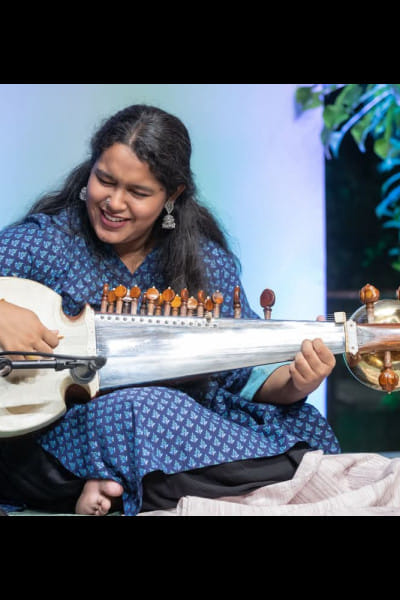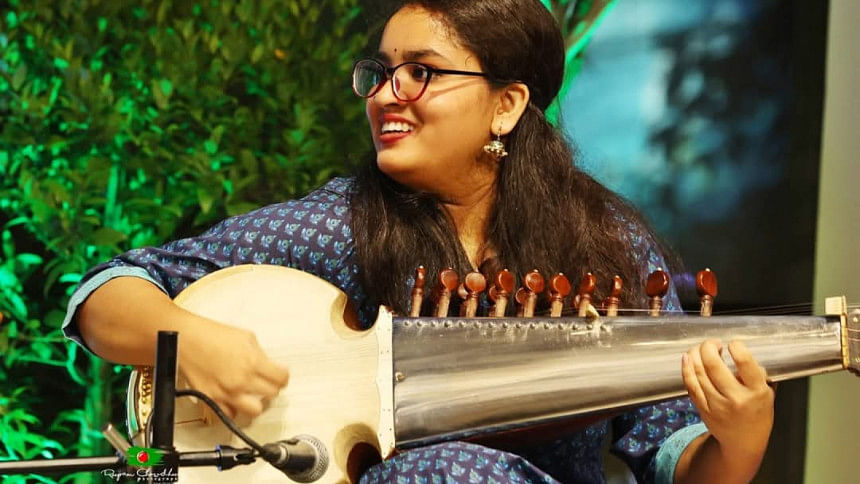Sarod, sisterhood, and the quiet defiance of convention

Their story is not about overnight success or going viral on social media. It's about continuity — not just of a musical tradition, but of familial responsibility, cultural defiance, and personal conviction.
In an age of viral trends and digital distractions, the sarod does not exactly scream "popular". It doesn't feature in TikTok dance reels, nor does it fit easily into algorithm-driven playlists. And yet, in a modest room in Dhaka, two teenage sisters tune the strings of this 17 to 25-stringed instrument with the kind of reverence usually reserved for rituals. They are Ilham Fuljhuri Khan and Isra Fuljhuri Khan — known to most simply as the Fuljhuri Sisters.
Born into sound, not silence
For Ilham and Isra Fuljhuri Khan, music was not a choice — it was an inheritance. Their father, Ustad Md Iliyas Khan is a tabla player; their mother, Supriya Akter, introduced them to vocal music early on.
"In our childhood, both of us had our teachings in singing from our mother and in tabla from our father," Ilham recalls. By 2015, the sarod entered their lives. "Our father placed the first sarod in our hands," says Ilham. "Since then, we've been learning together."
The weight of legacy is undeniable. "We are the sixth generation in our family involved in music," Ilham notes.
Isra adds, "My paternal grandfather is Ustad Fuljhuri Khan, a Swadhinata Padak winner. And we are descendants of Ustad Alauddin Khan."
This is not a casual lineage. It's a living discipline — practised daily, carried with care, and quietly passed on through the fingers of two teenage girls playing an instrument most people their age cannot even name.
The sarod sisters
Though both trained in vocals and tabla, it is the sarod that shaped their identity, so much so that audiences and organisers alike began referring to them simply as the Sarod Sisters or Fuljhuri Sisters.
"We didn't plan it," Ilham reflects. "It just happened. We performed our first duet in 2017 at a Baithak at Bengal Parampara Sangeetalay. People liked it. And then it just stuck."
Performing mostly in duets, they have carved out an identity that balances individuality and synergy.

Isra, the younger sister, is already composing her own pieces and working in studios on soundtracks, commercials, and projects. Ilham, balancing HSC exams and daily riyaz, maintains a quieter presence, but when they play together, there's no "older" or "younger." Just music.
Not glamorous, not easy
It's easy to romanticise their journey. Daughters of a musical dynasty, trained under maestros like Pandit Tejendra Narayan Majumdar and Kaushik Mukherjee. But the sisters are candid about the less pleasant parts.
"We live in a country where classical music is not prioritised. That's just the reality," Ilham says without bitterness. "People think girls should not be out performing in the evening. And they don't stop."
Their defence? Silence. Practice. Progress.

Their parents, especially their mother, have acted as the first line of resistance. "My mother has endured more than people know," Ilham says. "All so we would not have to."
Isra adds, "People say things. I've stopped listening."
What comes next?
For now, they're focused on refinement. "There's still so much to learn from our Guruji," Ilham says.
Isra dreams of performing with him someday — not as equals, but as a disciple, on the same stage.
Isra's broader aspiration is to make classical music more accessible, especially to people her age. "Right now, children don't listen to it. Maybe they don't relate. I want to change that. Not to make it trendy, but to make it visible."

Their performances are slowly gaining ground in festivals and unconventional venues. Isra has already played with Chirkutt at the Joy Bangla Concert and in experimental platforms like Dhaka Makers and the Rishka Festival. Ilham, the quieter half, focuses more on the purity of form and on making it to her next exam without dropping her sarod.
No hashtags, just harmony
The Fuljhuri Sisters are not here to entertain the algorithm. They are here to hold onto something that many are letting slip — an entire vocabulary of music that predates YouTube, Spotify, and the attention economy.
So, the next time you hear a drone of strings and mistake it for background score, listen a little harder. It might be two sisters, a pair of sarods, and generations of tradition, threading their way into a future that still has room for silence, depth, and sound that refuses to be forgotten.

Photos: Courtesy

 For all latest news, follow The Daily Star's Google News channel.
For all latest news, follow The Daily Star's Google News channel. 



Comments